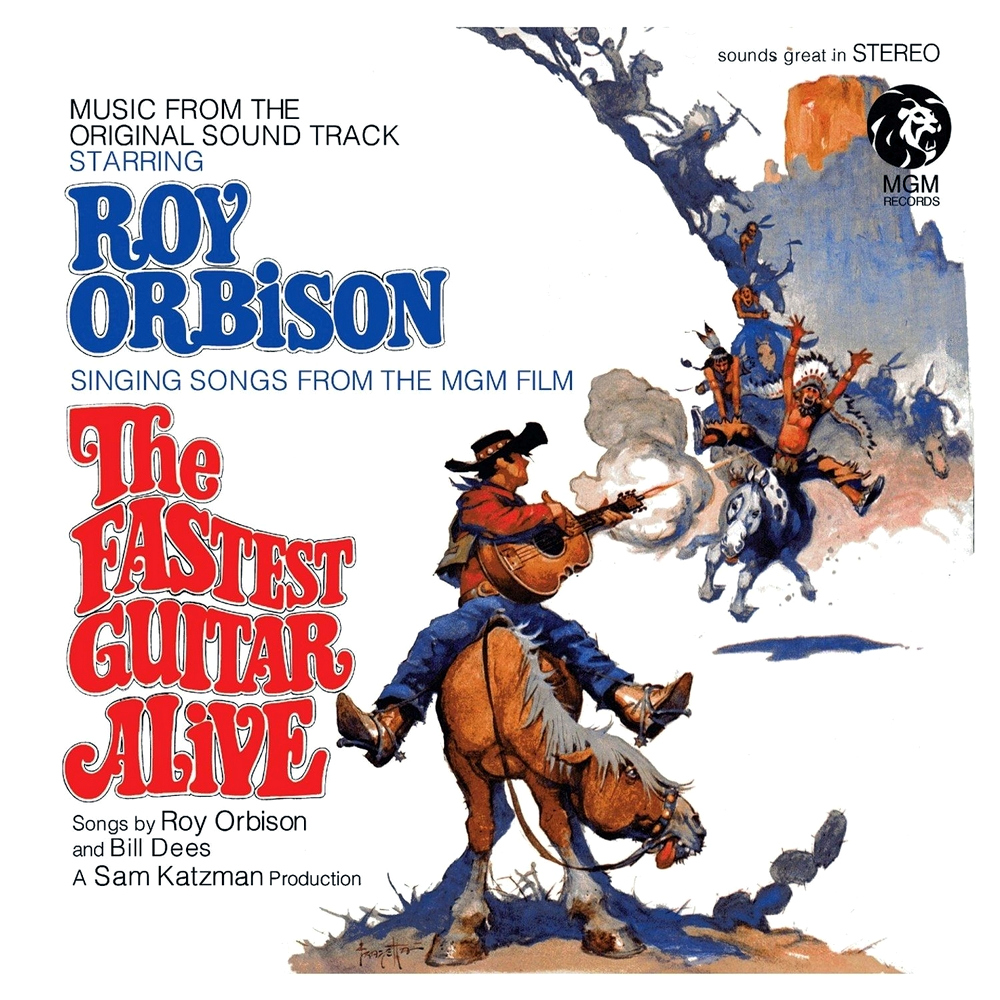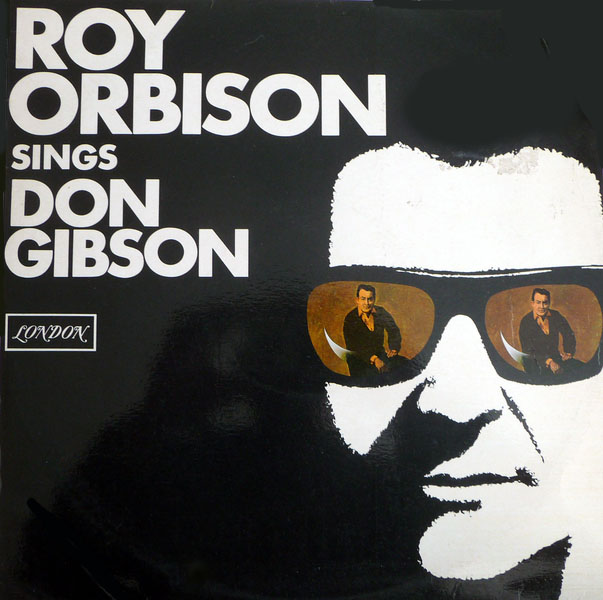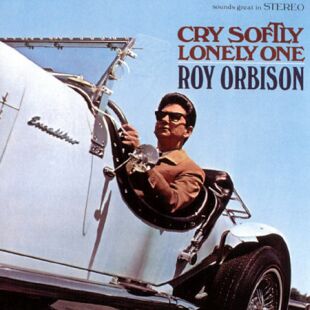
Rock and roll music
| The Fastest Guitar Alive | ||||
|---|---|---|---|---|
 | ||||
| Soundtrack album by | ||||
| Released | June 1967 | |||
| Recorded | August 9 – December 22, 1966 | |||
| Genre | Rock and roll | |||
| Length | 22:27 | |||
| Label | MGM (E 4475) | |||
| Producer | Wesley Rose & Jim Vienneau | |||
| Roy Orbison chronology | ||||
| ||||
Whirlwind | The Fastest Guitar Alive | Warner Archive · Channel: Warner Bros. Classics · 2m 20s


Roy Orbison - Medicine Man · Channel: Hanniev01 · 2m 48s

Roy Orbison: River from The Fastest Guitar Alive · Channel: Roy Orbison · 3m 4s

Roy Orbison: Pistolero from The Fastest Guitar Alive · Channel: Roy Orbison · 2m 55s

ROY ORBISON - ROLLIN' ON (FILM VIDEO) · Channel: Elvis Presley and Roy Orbison Fans in the world · 2m 16s

Roy Orbison: Pistolero from The Fastest Guitar Alive · Channel: Roy Orbison · 2m 55s

Good Time Party (From The Fastest Guitar Alive Soundtrack ... · Channel: Roy Orbison - Topic · 2m 24s

Heading South (Remastered 2015) · Channel: Roy Orbison - Topic · 2m 45s

Best Friend (Remastered 2015) · Channel: Roy Orbison - Topic · 2m 39s

THERE WON'T BE MANY COMING HOME by Roy Orbison · Channel: Roy Orbison · 2m 46s
Álbums chronology
The Fastest Guitar Alive
Roy Orbison
Discográfica: MGM (E 4475) · · Productor: Wesley Rose & Jim Vienneau
From Wikipedia, the free encyclopedia
Leer más
Review
From Wikipedia, the free encyclopedia
Leer más
1967 film by Michael D. Moore
| The Fastest Guitar Alive | |
|---|---|
| Theatrical film poster by Frank Frazetta | |
| Directed by | Michael D. Moore |
| Written by | Robert E. Kent |
| Produced by | Sam Katzman |
| Starring | Roy Orbison Sammy Jackson Maggie Pierce |
| Cinematography | W. Wallace Kelley |
| Edited by | Ben Lewis |
| Music by | Roy Orbison Bill Dees Fred Karger |
| Color process | Metrocolor |
| Production company | Four Leaf Productions |
| Distributed by | Metro-Goldwyn-Mayer |
| Release date |
|
| Running time | 87 minutes |
| Country | United States |
| Language | English |
The Fastest Guitar Alive is a 1967 American musical comedy Western film, directed by Michael D. Moore with singer Roy Orbison in his only starring role as an actor.
The film features Orbison performing seven original songs, which appeared on his 1967 MGM album of the same name. His song "There Won`t Be Many Coming Home" is featured in the 2015 western film The Hateful Eight.
Plot
Near the end of the American Civil War, a Southern spy (Orbison) with a bullet-shooting guitar is given the task of robbing gold bullion from the United States Mint in San Francisco to help finance the ill-fated Confederacy`s last-ditch war effort.
Cast
- Roy Orbison as Johnny Banner
- Sammy Jackson as Steve Menlo
- Maggie Pierce as Flo Chesnut
- Joan Freeman as Sue Chesnut
- Lyle Bettger as Charlie
- John Doucette as Marshal Max Cooper
- Patricia Donahue as Stella DeWitt
- Ben Cooper as Deputy Rink
- Ben Lessy as Indian Chief
- Douglas Kennedy as Sheriff Joe Stedman
- Iron Eyes Cody as First Indian
- Sam the Sham as First Expressman
Production and release
Filming began September 1966.[1] Although Orbison was pleased with the film, it proved to be a critical and box office flop. While MGM had included five films in his contract, no more were made.[2][3]
Soundtrack
| Review scores | |
|---|---|
| Source | Rating |
| Allmusic | [4] |
| The Encyclopedia of Popular Music | [5] |
A soundtrack album for the film was released in June 1967 on MGM Records. It was the only album to consist entirely of Roy Orbison/Bill Dees originals. Its single "There Won`t Be Many Coming Home" reached No. 18 in the UK and entered the Australian chart at its highest position of #32 before slipping down the chart.
Reception
Richie Unterberger of AllMusic said the album "includes what may be his best obscure tune, the rarely anthologized "Whirlwind." With its galloping rhythm, emotive operatic vocals, swirling strings, and ghostly backing vocals, it recalls the best uptempo ballads that he recorded during his early-`60s heyday at the Monument label."[6]
Billboard described as "a pack powerful emotion."[7]
Track listing
| No. | Title | Length |
|---|---|---|
| 1. | "Whirlwind" | 2:10 |
| 2. | "Medicine Man, Medicine Man" | 2:43 |
| 3. | "River" | 3:02 |
| 4. | "The Fastest Guitar Alive" | 3:08 |
| 5. | "Rollin` On" | 2:15 |
| No. | Title | Length |
|---|---|---|
| 1. | "Pistolero" | 2:58 |
| 2. | "Good Time Party" | 2:23 |
| 3. | "Heading South" | 2:45 |
| 4. | "Best Friend" | 2:38 |
| 5. | "There Won`t Be Many Coming Home" | 2:46 |
See also
- List of American films of 1967
From Wikipedia, the free encyclopedia
1967 film by Michael D. Moore
| The Fastest Guitar Alive | |
|---|---|
| Theatrical film poster by Frank Frazetta | |
| Directed by | Michael D. Moore |
| Written by | Robert E. Kent |
| Produced by | Sam Katzman |
| Starring | Roy Orbison Sammy Jackson Maggie Pierce |
| Cinematography | W. Wallace Kelley |
| Edited by | Ben Lewis |
| Music by | Roy Orbison Bill Dees Fred Karger |
| Color process | Metrocolor |
| Production company | Four Leaf Productions |
| Distributed by | Metro-Goldwyn-Mayer |
| Release date |
|
| Running time | 87 minutes |
| Country | United States |
| Language | English |
The Fastest Guitar Alive is a 1967 American musical comedy Western film, directed by Michael D. Moore with singer Roy Orbison in his only starring role as an actor.
The film features Orbison performing seven original songs, which appeared on his 1967 MGM album of the same name. His song "There Won`t Be Many Coming Home" is featured in the 2015 western film The Hateful Eight.
Plot
Near the end of the American Civil War, a Southern spy (Orbison) with a bullet-shooting guitar is given the task of robbing gold bullion from the United States Mint in San Francisco to help finance the ill-fated Confederacy`s last-ditch war effort.
Cast
- Roy Orbison as Johnny Banner
- Sammy Jackson as Steve Menlo
- Maggie Pierce as Flo Chesnut
- Joan Freeman as Sue Chesnut
- Lyle Bettger as Charlie
- John Doucette as Marshal Max Cooper
- Patricia Donahue as Stella DeWitt
- Ben Cooper as Deputy Rink
- Ben Lessy as Indian Chief
- Douglas Kennedy as Sheriff Joe Stedman
- Iron Eyes Cody as First Indian
- Sam the Sham as First Expressman
Production and release
Filming began September 1966.[1] Although Orbison was pleased with the film, it proved to be a critical and box office flop. While MGM had included five films in his contract, no more were made.[2][3]
Soundtrack
| Review scores | |
|---|---|
| Source | Rating |
| Allmusic | [4] |
| The Encyclopedia of Popular Music | [5] |
A soundtrack album for the film was released in June 1967 on MGM Records. It was the only album to consist entirely of Roy Orbison/Bill Dees originals. Its single "There Won`t Be Many Coming Home" reached No. 18 in the UK and entered the Australian chart at its highest position of #32 before slipping down the chart.
Reception
Richie Unterberger of AllMusic said the album "includes what may be his best obscure tune, the rarely anthologized "Whirlwind." With its galloping rhythm, emotive operatic vocals, swirling strings, and ghostly backing vocals, it recalls the best uptempo ballads that he recorded during his early-`60s heyday at the Monument label."[6]
Billboard described as "a pack powerful emotion."[7]
Track listing
| No. | Title | Length |
|---|---|---|
| 1. | "Whirlwind" | 2:10 |
| 2. | "Medicine Man, Medicine Man" | 2:43 |
| 3. | "River" | 3:02 |
| 4. | "The Fastest Guitar Alive" | 3:08 |
| 5. | "Rollin` On" | 2:15 |
| No. | Title | Length |
|---|---|---|
| 1. | "Pistolero" | 2:58 |
| 2. | "Good Time Party" | 2:23 |
| 3. | "Heading South" | 2:45 |
| 4. | "Best Friend" | 2:38 |
| 5. | "There Won`t Be Many Coming Home" | 2:46 |
See also
- List of American films of 1967

























![Orbisongs [Japan Sony BMG MHCP 862] Orbisongs [Japan Sony BMG MHCP 862]](/cache/muscol/muscol_cache_221_8daa8c4e90_orbisongsjapansonybmgmhcp8621730451657.jpg)





























